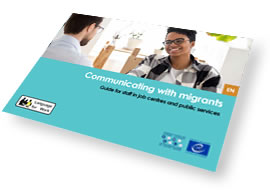 TRAINING AND CONSULTANCY OFFER
TRAINING AND CONSULTANCY OFFER
Trainings can be conducted in English, French, German, Swedish, Dutch, Italian.
This offer is targeted at teacher trainers, language teachers, vocational teachers, learning providers, civil servants responsible for integration programmes, linguistic researchers, employer organisations and trade unions, human resources, policymakers.
Request ECML Training and Consultancy activity
 VISIT THE RESOURCE BANK
VISIT THE RESOURCE BANK
Find practical tools, research, policy material and links to other relevant sites
 PUBLICATIONS IN OTHER LANGUAGES
PUBLICATIONS IN OTHER LANGUAGES
Quick guide to work-related language skills: How to help adult migrants develop work-related language skills
Available in Bulgarian, Croatian, Dutch, English, Estonian, Finnish, French, German, Irish, Italian, Romanian, Russian, Slovak, Spanish and Swedish
 Find out more Find out more
|
Communicating with migrants - Guide for staff in job centres and public services
Available in Bulgarian, Dutch English, French, German, Irish, Norwegian, Russian, Spanish and Swedish  Find out more Find out more
|
Kompetenzbeschreibungen für Fachkräfte, die das Sprachenlernen am Arbeitsplatz unterstützen
Available soon |
 LINGUISTIC INTEGRATION OF ADULT MIGRANTS
LINGUISTIC INTEGRATION OF ADULT MIGRANTS
Resources, initiatives and information from the Council of Europe’s LIAM working group
 Download the document
Download the document